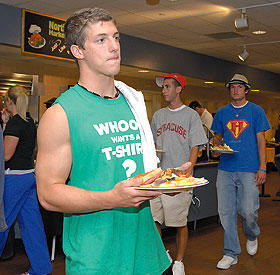  |
| HOME | THIS ISSUE | CALENDAR | GRANTS | BACK ISSUES | < BACK | NEXT > |
Trays eliminated from dining halls by Richard Veilleux - September 2, 2008 | ||||
| Spurred by the discovery last spring that eliminating trays from the University’s smallest dining facility also eliminated hundreds of pounds of food waste, Dining Services this fall has removed trays from all but one of the nine dining halls on the Storrs campus. “This is not a production decision but a consumer decision,” says Dennis Pierce, director of dining services. “There’s a trayless movement sweeping the nation. We have to change our culture.” UConn officials tested the idea in March, when they teamed up with the Office of Environmental Policy and ran a three-week experiment at Whitney and Northwest dining facilities. During the first week of the experiment, dining hall staff weighed food waste, as students continued using trays. Two weeks later – the middle week was used for education – the trays were removed during dinner, and staff again weighed the waste. The result? About 760 pounds less food waste. Kitchen staff also ran the dishwasher about 150 fewer times, saving 913 gallons of water and 30.8 kilowatts an hour of energy. Spread across eight dining facilities for an entire academic year, rather than only a week, that should add up to some significant savings, says Pierce. “Our tipping fees will also be lower because we won’t dispose of as much waste, and we’ll save money on food because we’ll order less,” he adds. During the academic year, the dining halls serve 130,000 meals per week. Pierce and his staff had long suspected that letting students use trays led to waste, because the students tended to pile the trays with food, often far more than they could possibly eat. “Our staff complained about the waste all the time,” says Pierce. “Then at a conference, I heard about other schools trying to do without trays, so I decided we’d try it here too. It was a great success.” Pierce actually eliminated trays at the dining halls this summer, when conferences and sports camps keep dining staff busy. Since most visitors didn’t know that trays had been available previously, they didn’t seem to mind that there were none. Pierce suspects the reaction may be slightly different as the semester gets underway.
“The freshmen won’t know the difference, but I suspect there will be a healthy discussion upon the return of our juniors and seniors,” he says. “I hope they’ll soon see that their efforts make a difference. I think the majority of them will appreciate what we’re doing to help the environment.” The only dining hall that will have trays will be at South Campus, Pierce says. South will be allowed to use trays – albeit smaller trays than in the past – because of the size of the dining hall and because more conferences are held in South than other facilities with dining halls. National food service giant Aramark, which has more than 500 campus partners, recently conducted two nationwide studies and found that taking away trays resulted in a 25 to 30 percent reduction in food waste per person, according to a recent story in the Cleveland Plain Dealer. The study also found that 79 percent of the 92,000 students, faculty, and staff surveyed said they would support “trayless dining.” Aramark officials expect more than half of their campuses will go without trays this school year. Another food service company, Sodexo, partners with more than 200 campuses that have dispensed with trays. “A report issued by the National Association of College and University Food Services that looks at trends mentioned trayless dining this year,” says Pierce. “This year, it said trayless dining is no longer a trend – it’s a given.” |
| ADVANCE HOME UCONN HOME |

